Papers by Queen Esther Oye

Characterizing Political Cycles
SSRN Electronic Journal, 2014
Political business cycle research has continued to be limited to finding empirical evidence on wh... more Political business cycle research has continued to be limited to finding empirical evidence on whether politicians are a source of economic fluctuation. Unlike conventional business cycle research, studies that characterize the nature of political cycles are scarce; which is a problem arising from using qualitative dummy variables to capture political business cycle in literature. Therefore, this study bridges this gap by characterising the properties of political cycles in Nigeria. First, a Dynamic Factor Model is used to construct political cycle components. Once derived, the characteristics of constructed political shocks were measured. Our results were rather striking for a country such as Nigeria. The cyclical characteristics revealed that: political cycle is not subject to frequent fluctuation; and it contributes a negligible size as a source of economic fluctuations in Nigeria. A political economy implication of these findings is that politically-induced fluctuation is only a trivial source of shocks to Nigeria’s economy
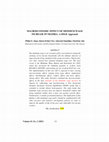
The minimum wage is an economic policy tool aimed at raising the earnings of low-income household... more The minimum wage is an economic policy tool aimed at raising the earnings of low-income households with the ultimate objective of improving the living standard of this group of workers. Nigeria has, over time, enacted four national minimum wage acts. The most recent is the Minimum Wage Repeal and Enactment Act 2019, which has increased the minimum payment to workers from N18,000 to N30,000; representing an rise of about 66.67 per cent. The implementation of this new bill is expected to have varying macroeconomic effects ranging from wage effects, employment effects, distributional effects, welfare effects and price effects, among others. This study, therefore examined the macroeconomic effects of the four episodes of the minimum wage increase in Nigeria by calibrating and log-linearising a New Keynesian Dynamic Stochastic General Equilibrium (DSGE) model that is extended to include labour heterogeneity. The study found that minimum wage increase does not improve household welfare an...

The macroeconomic effect of COVID-induced economic policy uncertainty in Nigeria: a DSGE approach
African Journal of Economic and Management Studies
PurposeThis study examined the macroeconomic effects of COVID-19-induced economic policy uncertai... more PurposeThis study examined the macroeconomic effects of COVID-19-induced economic policy uncertainty (EPU) in Nigeria. The study considered the effects of three related shocks: EPU, COVID-19 and correlated economic policy uncertainty and COVID-19 shock.Design/methodology/approachFirst, the study presented VAR evidence that fiscal and monetary policy uncertainty depresses real output. Thereafter, a nonlinear DSGE model with second-moment fiscal and monetary policy shocks was solved using the third-order Taylor approximation method.FindingsThe authors found that EPU shock is negligible and expansionary. By contrast, COVID-19 shocks have strong contractionary effects on the economy. The combined shocks capturing the COVID-19-induced EPU shock were ultimately recessionary after an initial expansionary effect. The implication is that the COVID-19 pandemic-induced EPU adversely impacted macroeconomic outcomes in Nigeria in a non-trivial manner.Practical implicationsThe result shows the im...

This study investigates the phenomena that dynamics in macroeconomic variables such as real outpu... more This study investigates the phenomena that dynamics in macroeconomic variables such as real output growth can be explained by changes or the removal of the person in charge of government, a phenomenon termed, government turnover. Using the Autoregressive Integrated Moving Average model (ARIMAX), the findings show that changes in head of government did not significantly explain variations in Nigeria‟s aggregate economy. In addition, changes in head of government correlated negatively with shifts in the economy. The political economy implication is that frequent changes in government (a measure of the extent of political instability) ca n affect negatively the aggregate economy. On the other hand, the insignificance of the political dummy variable measuring government turnover reflects either that: First, political shifts is a negligible source of fluctuation, secondly, that the Nigerian economy is resilient to absorb readily politically induced shocks and thirdly, that changes in hea...
National Budgeting, Security Issues and Sustainable Development in Nigeria

Addressing Budget and Debt Vulnerability amidst COVID-19: Policy Pathways for Nigeria
Budget constraints and rising debt burdens in Nigeria are macroeconomic issues that have to be ad... more Budget constraints and rising debt burdens in Nigeria are macroeconomic issues that have to be addressed sustainably. Such issues can clog the wheels of progress on economic growth and sustainable development in the country. This policy brief considers the disconnection between economic growth objectives and national budgeting amidst closely related problems of limited revenues, declining oil price, and the resulting debt burdens. Some options for policymakers to address the challenges as a vehicle to ensure better human capital outcomes are highlighted. These include: redefining Nigeria’s objectives for budgeting; shifting emphasis from budgetary allocations to funding; addressing inadequate revenue generation; and financing of the national budget. Others entail: improving budget implementation towards achieving the budgeting objectives; orientation of citizens to understand that federal government budgets should fund federal projects alone; and monitoring of sub-national governments.
Energy Demand, Fiscal Policy and Economic Growth in Nigeria: A Dsge Perspective

Optimal Fiscal and Monetary Policy Rules in Nigeria
Commodity-exporting and developing economies such as Nigeria can adopt fiscal rules that guarante... more Commodity-exporting and developing economies such as Nigeria can adopt fiscal rules that guarantee short-term macroeconomic stability and long-term fiscal sustainability. This study, in this respect, considered the relevance of fiscal rules where the fiscal balance of government reacts to the revenue base and state of the economy. The study also examined the desirability of the Taylor-type rule for the Nigerian economy. The study computed optimal monetary and fiscal rules using a Linear-Quadratic approximation of the equilibrium conditions in a New Keynesian Dynamic Stochastic General Equilibrium (DSGE) model. The parameters of the DSGE model were calibrated to suit the Nigerian economy. The main findings of the study showed that the optimized monetary rule obeys the Taylor principle while the optimized fiscal rule ensures a passive and countercyclical fiscal path. The implication of the finding shows that in the presence of a government that commits to a fiscal balance rule, it is desirable for the central bank to stabilize inflation while the government should avoid the procyclical bias.

Carbon Emissions and the Business Cycle in Nigeria
Investigating the behaviour of carbon dioxide emissions to different macroeconomic variables has ... more Investigating the behaviour of carbon dioxide emissions to different macroeconomic variables has become critical in the recent years in environmental policy. In fact, a number of studies have continued to analyse different possible determinants of carbon emissions. However, very little attention has been given to relating Real Business Cycles (RBCs) to carbon emissions in Nigeria. Thus, the main objectives of the study are; first, to document some stylised facts between the cyclical components of carbon emissions and Gross Domestic Product (GDP) including also the relationship with two major components of GDP that have been credited to be a major sources of emissions (agricultural sector and the industrial sector) through the use of the Hodrick-Prescott filter. Secondly, to investigate the response of emissions to real shocks using the Structural Vector Autoregressive (SVAR) approach. The study is able to find out that emissions are countercyclical to output, however, a pro-cyclical...

Explicit fiscal and monetary policy interactions in a small open economy
The issue of fiscal and monetary policy interactions has become relevant arising from economic ev... more The issue of fiscal and monetary policy interactions has become relevant arising from economic events like the formation of the European Monetary Union and the aftermath of the global financial crisis. This study characterizes the nature of fiscalmonetary interaction and gauges its joint transmitted effect on inflation and output in Nigeria. The interactions are examined by calibrating and simulating a New Keynesian Dynamic Stochastic General Equilibrium (NK DSGE) model that includes an interaction effect equation. The explicit policy interaction variable is essentially relevant to quantify the joint macroeconomic effect of mixing fiscal and monetary tools in an economy. The study found that both fiscal and monetary policies interact as strong complements. This means that when one policymaker implements the expansionary measure, the other policymaker corroborates this action using expansionary policy. The common variable that explicitly captures the interaction between fiscal policy...
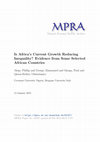
Is Africa's current growth reducing inequality? What are the implications of growth on output per... more Is Africa's current growth reducing inequality? What are the implications of growth on output performances in Africa? Does the effect of Africa's growth on sectoral output have any implication for inequality in Africa? The study investigates the effect of shocks on a set of macroeconomic variables on inequality (measured by life expectancy) and the implication of this on sectors that are perceived to provide economic empowerment in form of employment for people living in the African countries in our sample. Studies already find that growth in many African countries has not been accompanied with significant improvement in employment. Therefore inequality is subject to a counter cyclical trend in production levels when export destination countries experience a recession. The study also provides insight on the effect of growth on sectorial output for three major sectors in the African economy with the intent of analyzing the impact of growth on sectorial development. The method used in this study is Panel Vector Autoregressive (PVAR) estimation and the obvious advantage of this method lies in the fact that it allows us to capture both static and dynamic interdependencies and to treat the links across units in an unrestricted fashion. Data is obtained from World Bank (WDI) Statistics for the period 1985 to 2012 (28 years) for 10 African Countries. Our main findings confirm strong negative relationship between GDP growth and life expectancy and also for GDP and the services and manufacturing sector considering the full sample.

In another report, The Central Bank of Nigeria (2011) also states that Nigeria needs to invest at... more In another report, The Central Bank of Nigeria (2011) also states that Nigeria needs to invest at least 100 billion dollars on roads in the next ten years. This study explores how social needs are realized within the public private participation (PPP) scheme in Nigeria. The study also situates public private partnership, in the Nigerian procurement and project operation context. The study's objectives are achieved by revisiting the mechanism design paradigm (through reviewing the historical evolution of Public Private Partnerships (PPPs) in Nigeria) and its impact on social goals as developed by Tirole and Maskin (2008), within the Nigerian context. Data Vol. IV, Issue 3 June 2014 on credit provided to the private sector as a percentage of GDP were used as proxies for PPP involvement from 1960 to 2010 although some years of data were missing. The method of estimation used included ordinary least squares, linear mixed effects models and seemingly unrelated regression estimation methods, which all allow for the investigation of relationships between a set of unrelated weakly exogenous variables, with the mixed effect method particularly suitable for iterative optimization processes. The findings show that cost implication concerns and the choice of the social function has an effect on PPP. It was also found that the electoral process which determines the social function mattered in the project selection stage and had significant effect on the PPP formation process.
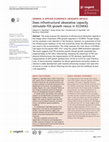
Cogent Economics & Finance
The study assesses the relevance of infrastructural absorptive capacity in the foreign direct inv... more The study assesses the relevance of infrastructural absorptive capacity in the foreign direct investment (FDI)-growth argument in ECOWAS. Though foreign aid has received a vast attention in the literature, however, an assessment of how the infrastructural readiness of the host economies drives the effectiveness of aid was vocal in this re-examination. The study assesses this main thrust in ECOWAS Sub-region for the period 1995-2017 using the system GMM estimation approach. The result suggests that FDI promotes growth though growth responded less proportionately to FDI influx. Alternatively, following the interaction of FDI and physical infrastructures, the responsiveness of FDI declined. Specifically, the responsiveness of GDP growth declined from 29.2% to 0.21% for road infrastructures. It hence becomes expedient for African government and policy makers to channel a viable development path towards enhancing transport and road infrastructures in order to attract financing into the space and the livelihood of poor rural population.
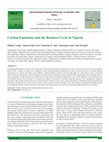
International Journal of Energy Economics and Policy, 2017
Investigating the behaviour of carbon dioxide emissions to different macroeconomic variables has ... more Investigating the behaviour of carbon dioxide emissions to different macroeconomic variables has become critical in the recent years in environmental policy. In fact, a number of studies have continued to analyse different possible determinants of carbon emissions. However, very little attention has been given to relating real business cycles (RBCs) to carbon emissions in Nigeria. Thus, the main objectives of the study are; first, to document some stylised facts between the cyclical components of carbon emissions and gross domestic product (GDP) including also the relationship with two major components of GDP that have been credited to be a major sources of emissions (agricultural sector and the industrial sector) through the use of the Hodrick-Prescott filter. Secondly, to investigate the response of emissions to real shocks using the structural vector autoregressive approach. The study is able to find out that emissions are countercyclical to output, however, a pro-cyclical relationship is established with the agricultural and industrial sector. RBC shocks are seen to have a positive effect on carbon emissions in Nigeria. The study, therefore, recommends the implementation of environmental policies targeted towards the agricultural and industrial sector given the pro-cyclical relationship obtained from the analysis.
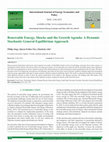
International Journal of Energy Economics and Policy 9(1), 160-167, 2019
Macroeconomic fluctuations observed in real economies are results of identifiable shocks in form ... more Macroeconomic fluctuations observed in real economies are results of identifiable shocks in form of technology, monetary, fiscal, trade, energy or a combination of these shocks. The adverse effects of energy price shocks, in recent decades, have made the call for renewable energy source important. This call is most appropriate in a mono-cultural economy where the fluctuations in crude oil pricing are easily transmitted into the economy. Therefore, this paper seeks to investigate the consequences of technology, and energy shocks on key macroeconomic variables including output and consumption using an energy augmented small open economy dynamic stochastic general equilibrium model. The model is estimated using Bayesian techniques under different scenarios in order to show the various ramifications of the shocks to the Nigerian economy. The findings show that shocks to the renewable energy sector have more impact of the Nigerian economy compared to shocks to the fossil fuel sector.
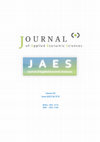
Journal of Applied Economic Sciences, Volume XIII, Fall 6(60): 1615-1622., 2018
Commodity-exporting and developing economies such as Nigeria can adopt fiscal rules that guarante... more Commodity-exporting and developing economies such as Nigeria can adopt fiscal rules that guarantee short-term
macroeconomic stability and long-term fiscal sustainability. This study, in this respect, considered the relevance of fiscal
rules where the fiscal balance of government reacts to the revenue base and state of the economy. The study also examined
the desirability of the Taylor-type rule for the Nigerian economy. The study computed optimal monetary and fiscal rules using
a Linear-Quadratic approximation of the equilibrium conditions in a New Keynesian Dynamic Stochastic General Equilibrium
(DSGE) model. The parameters of the DSGE model were calibrated to suit the Nigerian economy. The main findings of the
study showed that the optimized monetary rule obeys the Taylor principle while the optimized fiscal rule ensures a passive
and countercyclical fiscal path. The implication of the finding shows that in the presence of a government that commits to a
fiscal balance rule, it is desirable for the central bank to stabilize inflation while the government should avoid the procyclical
bias.

Covenant University Journal of Politics and International Affairs (CUJPIA) Vol. 3 No. 1, 2015
This study investigates the phenomena that dynamics in macroeconomic variables such as real outpu... more This study investigates the phenomena that dynamics in macroeconomic variables such as real output growth can be explained by changes or the removal of the person in charge of government, a phenomenon termed, government turnover. Using the Autoregressive Integrated Moving Average model (ARIMAX), the findings show that changes in the head of government did not significantly explain variations in Nigeria"s aggregate economy. In addition, changes in the head of government correlated negatively with shifts in the economy. The political economy implication is that frequent changes in government (a measure of the extent of political instability) can affect negatively the aggregate economy. On the other hand, the insignificance of the political dummy variable measuring government turnover reflects either that: First, political shifts is a negligible source of fluctuation, secondly, that the Nigerian economy is resilient to absorb readily politically induced shocks and thirdly, that changes in head of government have an indirect impact on the economy.

M P RA Is Africa's Current Growth Reducing Inequality? Evidence from Some Selected African Countries Is Africa's Current Growth Reducing Inequality? Evidence from Some Selected African Countries
Is Africa's current growth reducing inequality? What are the implications of growth on output... more Is Africa's current growth reducing inequality? What are the implications of growth on output performances in Africa? Does the effect of Africa's growth on sectorial output have any implication for inequality in Africa? The study investigates the effect of shocks on a set of macroeconomic variables on inequality (measured by life expectancy) and the implication of this on sectors that are perceived to provide economic empowerment in form of employment for people living in the African countries in our sample. Studies already find that growth in many African countries has not been accompanied with significant improvement in employment. Therefore inequality is subject to a counter cyclical trend in production levels when export destination countries experience a recession. The study also provides insight on the effect of growth on sectorial output for three major sectors in the African economy with the intent of analyzing the impact of growth on sectorial development. The metho...

According to statistics of the Federal Ministry of Works Nigeria (2012), total road network in Ni... more According to statistics of the Federal Ministry of Works Nigeria (2012), total road network in Nigeria currently stands at approximately 195,000 Kilometers, with the Federal, State and Local Governments responsible for 22, 21 and 51 percent of this network respectively. In another report, The Central Bank of Nigeria (2011) also states that Nigeria needs to invest at least 100 billion dollars on roads in the next ten years. This study explores how social needs are realized within the public private participation (PPP) scheme in Nigeria. The study also situates public private partnership, in the Nigerian procurement and project operation context. The study’s objectives are achieved by revisiting the mechanism design paradigm (through reviewing the historical evolution of Public Private Partnerships (PPPs) in Nigeria) and its impact on social goals as developed by Tirole and Maskin (2008), within the Nigerian context. Data on credit provided to the private sector as a percentage of GDP...
Drafts by Queen Esther Oye
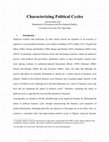
Studies in the political business cycle literature have remained largely skewed to the source of ... more Studies in the political business cycle literature have remained largely skewed to the source of Political cycle and have left out explaining the nature of political cycles. Consequently, this paper attempts to fill this identified empirical gap by characterizing the business cycle properties of political fluctuations. The study used the dynamic factor model technique to construct a coincident index that approximates political cycles in Nigeria
First, we
construct a coincident index that approximates political cycles in Nigeria, using the dynamic factor model technique. Then, we characterize the cyclical features of the constructed political
cycle in terms of properties such as volatility, persistence and co-movements. In addition, we do
a duration analysis of the cycle using the BBQ algorithm3
In the preceding section, our results revealed that although the political cycle is persistent and
can be characterised as a cycle, yet its magnitude is small (using the mean value and standard
deviation as a measure of the size of politics as a source of economic fluctutation). Furthermore,
we found that political cycle produced countercyclical effects on the Nigerian economy. This
countercyclical nature is supported by both the higher duration and number of contractions than
expansions in the business cycle dating of political cycles.
Two features, worthy of note are the small magnitude and the countercyclical nature of the
political cycle. From a political economy dimension, realising that political shocks are negligible
means that they are not a major source of economic fluctuation in Nigeria. Yet, despite its
negligible size, the countercyclical nature of political cycle means that it negatively impacts the
economy.











Uploads
Papers by Queen Esther Oye
macroeconomic stability and long-term fiscal sustainability. This study, in this respect, considered the relevance of fiscal
rules where the fiscal balance of government reacts to the revenue base and state of the economy. The study also examined
the desirability of the Taylor-type rule for the Nigerian economy. The study computed optimal monetary and fiscal rules using
a Linear-Quadratic approximation of the equilibrium conditions in a New Keynesian Dynamic Stochastic General Equilibrium
(DSGE) model. The parameters of the DSGE model were calibrated to suit the Nigerian economy. The main findings of the
study showed that the optimized monetary rule obeys the Taylor principle while the optimized fiscal rule ensures a passive
and countercyclical fiscal path. The implication of the finding shows that in the presence of a government that commits to a
fiscal balance rule, it is desirable for the central bank to stabilize inflation while the government should avoid the procyclical
bias.
Drafts by Queen Esther Oye
First, we
construct a coincident index that approximates political cycles in Nigeria, using the dynamic factor model technique. Then, we characterize the cyclical features of the constructed political
cycle in terms of properties such as volatility, persistence and co-movements. In addition, we do
a duration analysis of the cycle using the BBQ algorithm3
In the preceding section, our results revealed that although the political cycle is persistent and
can be characterised as a cycle, yet its magnitude is small (using the mean value and standard
deviation as a measure of the size of politics as a source of economic fluctutation). Furthermore,
we found that political cycle produced countercyclical effects on the Nigerian economy. This
countercyclical nature is supported by both the higher duration and number of contractions than
expansions in the business cycle dating of political cycles.
Two features, worthy of note are the small magnitude and the countercyclical nature of the
political cycle. From a political economy dimension, realising that political shocks are negligible
means that they are not a major source of economic fluctuation in Nigeria. Yet, despite its
negligible size, the countercyclical nature of political cycle means that it negatively impacts the
economy.
macroeconomic stability and long-term fiscal sustainability. This study, in this respect, considered the relevance of fiscal
rules where the fiscal balance of government reacts to the revenue base and state of the economy. The study also examined
the desirability of the Taylor-type rule for the Nigerian economy. The study computed optimal monetary and fiscal rules using
a Linear-Quadratic approximation of the equilibrium conditions in a New Keynesian Dynamic Stochastic General Equilibrium
(DSGE) model. The parameters of the DSGE model were calibrated to suit the Nigerian economy. The main findings of the
study showed that the optimized monetary rule obeys the Taylor principle while the optimized fiscal rule ensures a passive
and countercyclical fiscal path. The implication of the finding shows that in the presence of a government that commits to a
fiscal balance rule, it is desirable for the central bank to stabilize inflation while the government should avoid the procyclical
bias.
First, we
construct a coincident index that approximates political cycles in Nigeria, using the dynamic factor model technique. Then, we characterize the cyclical features of the constructed political
cycle in terms of properties such as volatility, persistence and co-movements. In addition, we do
a duration analysis of the cycle using the BBQ algorithm3
In the preceding section, our results revealed that although the political cycle is persistent and
can be characterised as a cycle, yet its magnitude is small (using the mean value and standard
deviation as a measure of the size of politics as a source of economic fluctutation). Furthermore,
we found that political cycle produced countercyclical effects on the Nigerian economy. This
countercyclical nature is supported by both the higher duration and number of contractions than
expansions in the business cycle dating of political cycles.
Two features, worthy of note are the small magnitude and the countercyclical nature of the
political cycle. From a political economy dimension, realising that political shocks are negligible
means that they are not a major source of economic fluctuation in Nigeria. Yet, despite its
negligible size, the countercyclical nature of political cycle means that it negatively impacts the
economy.